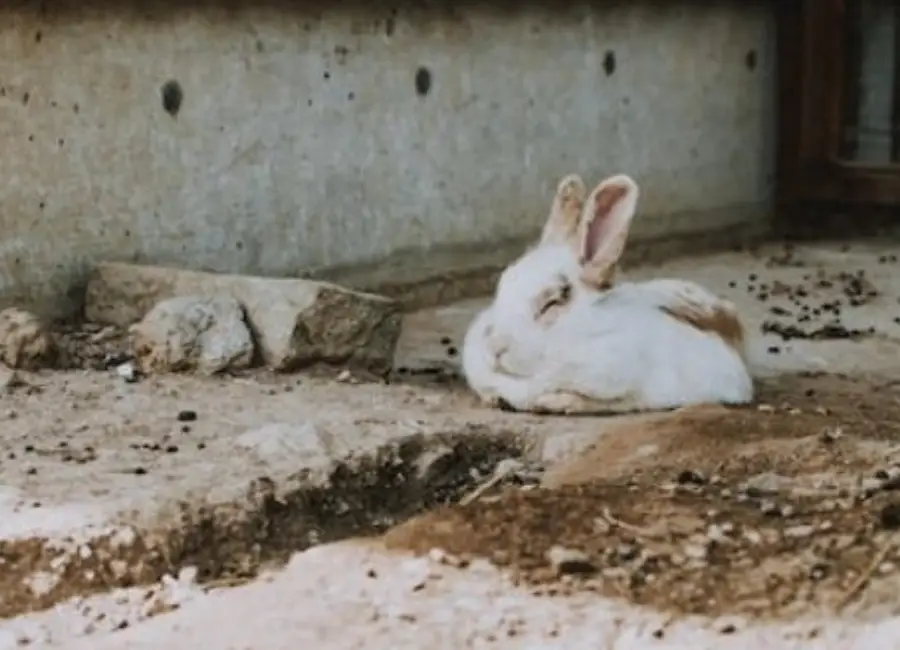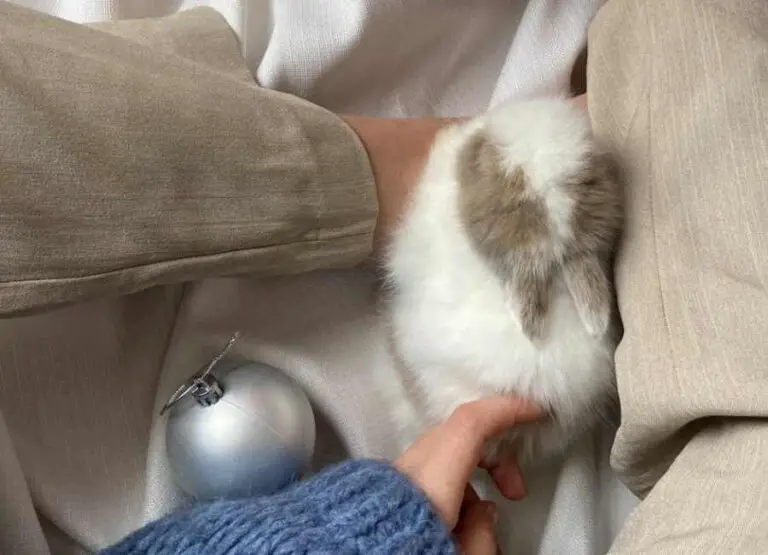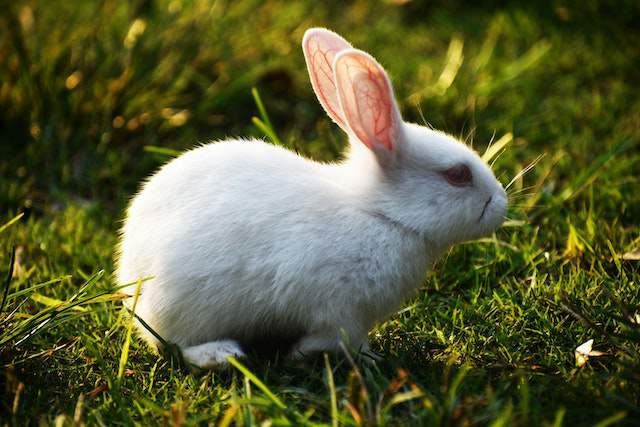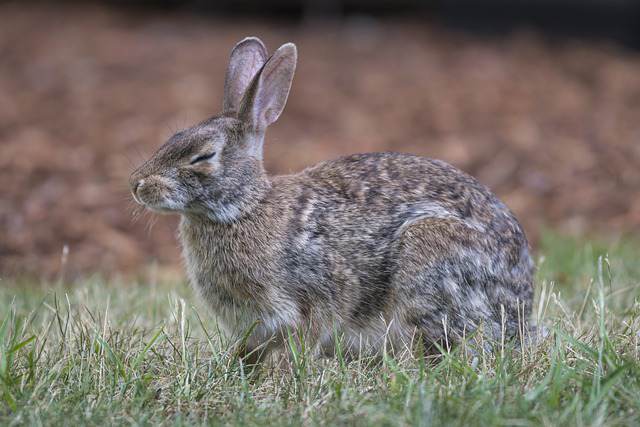12 Common Sick Rabbit Symptoms With Tips

We all want our fur babies to be healthy and happy, but sometimes our little hopping friends can fall ill too.
In this blog post, we’ll dive into the world of sick rabbit symptoms, helping you understand what to look out for and how to give your furry friend the care they need.
Let’s get started!
Sick Rabbit Symptoms
Sick rabbit symptoms can include loss of appetite, lethargy, diarrhea, respiratory issues, such as sneezing or coughing, and changes in behavior or appearance.
It is important to consult a veterinarian if you notice any of these symptoms in your rabbit to ensure proper diagnosis and treatment.
Let’s dive deeper…
The following are some of the most common sick rabbit symptoms:
1. Not Eating As Usual
Not eating as usual is a significant sign of a sick rabbit, and there are several common causes for a rabbit to stop eating.
One potential cause is dental problems, such as overgrown teeth or tooth abscesses, which can make it painful for the rabbit to chew.
Gastrointestinal stasis, also known as “gut stasis,” is another common cause, where the rabbit’s digestive system slows down or stops working altogether.
Stress, illness, or changes in the rabbit’s environment can also lead to a loss of appetite. If a rabbit is not eating, it is crucial to seek veterinary attention promptly.
A vet can diagnose the underlying cause and provide appropriate treatment, which may include dental care, medication, or dietary adjustments.
2. Altered Droppings or Not Pooping As Usual
Altered droppings or not pooping can be a sign of a sick rabbit. There are several common causes for this condition. One possible cause is gastrointestinal stasis, which occurs when the rabbit’s digestive system slows down or stops completely.
This can be caused by various factors such as a poor diet, dehydration, stress, or dental issues. Another potential cause is an intestinal blockage, which can be caused by ingesting foreign objects or hairballs.
In such situations, it is important to seek veterinary care immediately. A veterinarian will be able to diagnose the underlying cause and provide appropriate treatment, which may include pain medication, fluid therapy, dietary changes, or even surgery if necessary.
3. Decreased Energy or Lethargy
Decreased energy or lethargy in rabbits is a sign of illness and should be taken seriously. There are several common causes for this symptom.
One possibility is gastrointestinal stasis, which occurs when a rabbit’s digestive system slows down or stops working. Another potential cause is dental problems, such as overgrown teeth or tooth root abscesses, which can lead to pain and decreased appetite.
Infections, such as respiratory or urinary tract infections, can also cause lethargy in rabbits. If a rabbit is showing signs of decreased energy, it is important to seek veterinary care immediately.
The vet will be able to diagnose the underlying cause and provide appropriate treatment, which may include medication, dietary changes, or dental procedures. Prompt intervention can greatly improve the rabbit’s chances of a full recovery.
4. Poor Grooming Habits
Poor grooming habits can be an indication of a sick rabbit. There are several common causes for this behavior. One possible cause is dental issues, which can make it difficult for the rabbit to groom itself properly.
Another cause could be pain or discomfort, such as from arthritis or an injury. Stress or anxiety may also lead to decreased grooming.
To address the situation, it is important to first identify the underlying cause. A thorough examination by a veterinarian specializing in exotic animals is recommended.
Treatment options will depend on the specific cause but may include dental care, pain management, or addressing any underlying stressors. Additionally, providing a clean and comfortable living environment, along with a balanced diet, can help support the rabbit’s overall health and grooming habits.
5. Raspy or Heavy Breathing
Raspy or heavy breathing in rabbits can be a sign of a respiratory illness. Common causes include bacterial or viral infections, allergies, and dental problems. If a rabbit is exhibiting raspy breathing, it is essential to seek veterinary care promptly.
The veterinarian may conduct a thorough examination, including listening to the rabbit’s lungs and checking for any dental issues. Treatment options may include antibiotics, antihistamines, or dental procedures.
Additionally, ensuring a clean and dust-free environment, providing proper ventilation, and avoiding exposure to potential allergens can help prevent respiratory issues in rabbits.
6. Hunching or Posture Changes
Hunching or posture changes in rabbits can be a sign of illness and should not be ignored. One common cause of hunching is gastrointestinal stasis, which is a condition where the digestive system slows down or stops functioning properly.
This can be caused by a poor diet, lack of exercise, or stress. Another cause of hunching is pain, which may be due to dental issues, bladder stones, or other underlying health problems.
If you notice your rabbit hunching or exhibiting changes in posture, it is important to seek veterinary assistance immediately.
Delaying treatment can worsen their condition and lead to more serious complications. In the meantime, ensure that your rabbit has access to fresh water, a balanced diet, and a stress-free environment.
7. Diarrhea or Constipation
Diarrhea and constipation are both signs of a sick rabbit and should be addressed promptly. Diarrhea in rabbits can be caused by various factors, including dietary changes, stress, bacterial or viral infections, or underlying health issues.
If a rabbit has diarrhea, it is important to ensure they stay hydrated and provide them with a diet of hay and water. However, if the diarrhea persists or is accompanied by other symptoms such as lethargy or loss of appetite, it is crucial to seek veterinary advice.
On the other hand, constipation in rabbits can be a result of inadequate fiber intake, dehydration, or dental problems. To alleviate constipation, providing a fiber-rich diet, offering fresh vegetables, and encouraging exercise can help.
If the constipation persists, it is recommended to consult a veterinarian for further evaluation and treatment options.
8. Swelling on the Mouth or Face
Swelling on the mouth or face in rabbits can be a sign of illness and should be taken seriously. There are several common causes for this condition.
One possible cause is dental problems, such as abscesses or overgrown teeth, which can result in inflammation and swelling.
Another common cause is an allergic reaction to something in the rabbit’s environment, such as bedding or food. Infections, such as respiratory or skin infections, can also lead to swelling.
If you notice swelling on your rabbit’s mouth or face, it is important to seek veterinary attention immediately. The vet will be able to diagnose the underlying cause and provide appropriate treatment.
In the meantime, you can try to keep your rabbit comfortable by providing soft, easily digestible food and ensuring they have access to fresh water. Avoid handling the affected area to prevent further irritation.
9. Runny Nose or Runny Eyes
Runny nose or runny eyes in rabbits can be indicative of an underlying health issue. There are several common causes for these symptoms. Respiratory infections, such as snuffles, are a frequent culprit, often caused by the bacteria Pasteurella multocida.
Allergies, especially to dust, pollen, or certain types of bedding, can also lead to runny nose or runny eyes in rabbits. Additionally, dental problems or foreign objects in the nasal cavity can cause similar symptoms.
If a rabbit presents with a runny nose or runny eyes, it is crucial to consult a veterinarian experienced in rabbit care. The vet will conduct a thorough examination and may recommend further diagnostic tests, such as swabs or x-rays, to determine the underlying cause.
Treatment options will depend on the specific diagnosis but can include antibiotics, antihistamines, or dental procedures. It is essential to keep the rabbit’s environment clean and well-ventilated to prevent further respiratory issues. Prompt veterinary attention is crucial to ensure the rabbit’s health and well-being.
10. Hair Loss or Matted Fur
Hair loss or matted fur in rabbits can be a sign of an underlying health issue. Several common causes can lead to this condition.
One possible cause is mites, which are tiny parasites that can infest a rabbit’s fur and skin, causing itching and hair loss. Another common cause is a fungal infection, such as ringworm, which can cause patchy hair loss and scaly skin.
Stress and poor diet can also contribute to hair loss or matted fur in rabbits. Stress can weaken the immune system, making rabbits more susceptible to skin problems.
A diet lacking essential nutrients, especially those required for healthy fur growth, can result in poor coat quality.
If a rabbit is showing signs of hair loss or matted fur, it is crucial to consult a veterinarian experienced in rabbit care. The vet will conduct a thorough examination, possibly including skin scrapings or fur plucking, to determine the underlying cause.
Treatment will depend on the specific diagnosis, but it may include medication, dietary adjustments, or environmental changes to reduce stress.
Regular grooming, including brushing and removing any mats, can help prevent hair loss or matted fur in rabbits.
Additionally, providing a balanced and nutritious diet, along with a clean and stress-free environment, can promote overall health and maintain a vibrant coat.
11. Change in Urinating Habits
Change in urinating habits is a sign of a sick rabbit. There are several common causes for this change. One possible cause is urinary tract infection, which can lead to frequent urination or blood in the urine.
Another cause could be bladder stones, which can cause pain and difficulty in urination. Kidney disease can also lead to changes in urinating habits, such as increased or decreased urine output.
If you notice any changes in your rabbit’s urinating habits, it is important to consult a veterinarian for a proper diagnosis and treatment.
They may recommend a urine test, imaging, or other diagnostic tools to determine the underlying cause and provide appropriate care for your rabbit.
12. Rapid Weight Loss
Rapid weight loss in rabbits can be a sign of underlying health issues. Several common causes include dental problems, gastrointestinal issues, parasites, and stress. Dental issues can prevent rabbits from eating properly, leading to weight loss.
Gastrointestinal problems, such as diarrhea or blockages, can also result in rapid weight loss. Parasites, like worms or mites, can affect a rabbit’s ability to absorb nutrients, leading to weight loss.
Lastly, stress, such as a change in environment or diet, can cause rabbits to lose weight. If you notice rapid weight loss in your rabbit, it is crucial to seek veterinary attention immediately.
A vet can diagnose the underlying cause and provide appropriate treatment to help your rabbit regain weight and improve their overall health.
Read more about common health problems in rabbits.
Ways of Caring for a Sick Rabbit at Home
Caring for a sick rabbit at home requires knowledge and attention to detail. While it is always recommended to consult a veterinarian for professional advice, here are some common ways to care for a sick rabbit at home:
1. Isolate the Rabbit: If you notice any signs of illness in your rabbit, it is important to isolate them from other rabbits to prevent the spread of disease.
2. Provide a Quiet Environment: Create a quiet and stress-free environment for your rabbit. Loud noises and excessive handling can worsen their condition.
3. Monitor Food and Water Intake: Ensure your rabbit has access to fresh water and monitor their food intake. Offer their regular diet and provide hay, which is essential for their digestive health.
4. Maintain Proper Hygiene: Keep your rabbit’s living space clean and dry. Regularly clean the cage or hutch to prevent the buildup of waste and bacteria.
5. Administer Medication: If prescribed by a veterinarian, follow the instructions for administering medication carefully. Be sure to complete the full course of treatment.
6. Provide Comfortable Bedding: Use soft and comfortable bedding material for your rabbit. Avoid materials that may cause respiratory irritation, such as cedar or pine shavings.
7. Monitor Body Temperature: Ensure your rabbit’s environment is kept at an appropriate temperature. Avoid extreme heat or cold, as rabbits are sensitive to temperature changes.
8. Offer Supportive Care: Provide extra care and attention to your sick rabbit. Offer gentle petting and reassurance to help reduce stress.
9. Seek Veterinary Attention: If your rabbit’s condition does not improve or worsen, consult a veterinarian with experience in rabbit care. They can provide a proper diagnosis and recommend appropriate treatment options.
Remember, these are general guidelines and may vary depending on the specific illness or condition your rabbit is experiencing. It is always best to consult with a veterinarian for personalized advice and treatment.
Frequently Asked Questions
How can I tell if my rabbit is sick?
Look out for signs such as decreased appetite, lethargy, changes in behavior, runny nose or eyes, diarrhea, or abnormal discharge. Any of these symptoms may indicate illness in your rabbit.
My rabbit is sneezing a lot. Should I be concerned?
Frequent sneezing could be a sign of a respiratory infection or allergies. It’s best to consult a veterinarian to determine the cause and provide appropriate treatment for your rabbit’s sneezing.
What should I do if my rabbit has diarrhea?
Diarrhea in rabbits can be a sign of various underlying health issues, such as gastrointestinal problems or diet-related issues. Ensure your rabbit has access to fresh water and hay, and consult a vet for proper diagnosis and treatment.
Can stress make my rabbit sick?
Yes, stress can weaken your rabbit’s immune system, making it more susceptible to illness. Provide a calm and safe environment for your rabbit, and minimize any changes or disruptions that may cause stress.
My rabbit has a loss of appetite. What should I do?
A decreased appetite in rabbits can indicate a range of health issues, including dental problems, gastrointestinal issues, or pain. It’s crucial to seek veterinary attention to identify the underlying cause and provide appropriate treatment.
What are common signs of dental problems in rabbits?
Rabbits with dental issues may exhibit symptoms like drooling, difficulty eating or chewing, weight loss, or excessive salivation. If you notice any of these signs, it’s important to consult a veterinarian who specializes in rabbit care.
Conclusion
In conclusion, if you notice any of these sick rabbit symptoms in your furry friend, it’s crucial to act swiftly.
Remember, rabbits are masters at hiding their illnesses, so pay close attention to any changes in behavior, appetite, or stool.
Don’t hesitate to seek veterinary care to ensure your rabbit’s health and happiness.


![12 Abnormal Rabbit Behaviour [Meaning & Tips] Abnormal Rabbit Behaviour](https://petcreeks.com/wp-content/uploads/2023/10/pexels-magda-ehlers-9348913.jpg)
![How to Comfort a Dying Rabbit [12 Helpful Strategies] How to Comfort a Dying Rabbit](https://petcreeks.com/wp-content/uploads/2023/10/How-to-Comfort-a-Dying-Rabbit.jpg)


